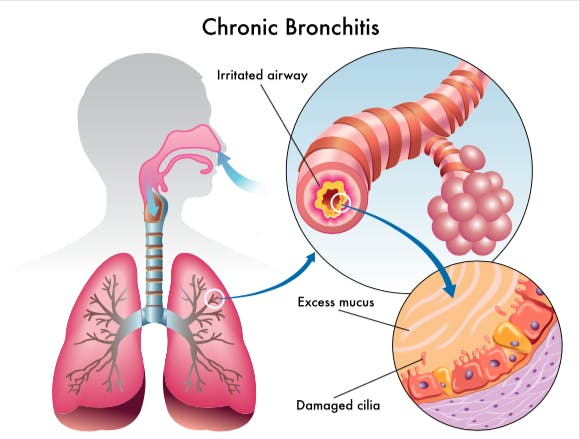Understanding chronic bronchitis and living life with COPD
If you’ve had a persistent cough over the last few months, you might be wondering if it’s just a pesky allergy or something more serious — like chronic bronchitis, a disease that causes swelling of the bronchi – which are the air passages between the mouth, nose, and lungs.
Chronic bronchitis is part of a group of lung diseases known collectively as a chronic obstructive pulmonary disease (COPD). It is marked by a productive cough that lasts for three or more months each year, for at least two years in a row.
COPD is a leading cause of death in the United States and also includes emphysema and asthma.
The disease affects 16 million Americans, as well as millions more who don’t know they have it.
While there’s currently no cure for COPD, it’s usually preventable and can be effectively managed.
What causes chronic bronchitis and can it be prevented?
The most common cause of COPD is cigarette smoking, but it can also be caused by viruses and bacteria, as well as long-term exposure to pollutants.
In fact, COPD may be the basis for workers’ compensation if it’s caused by air pollutants in the workplace.
Acute bronchitis, on the other hand, is caused by a virus. While it’s not always possible to prevent acute bronchitis, you can minimize your risk.
- Regular hand washing can help reduce your exposure to viruses and bacteria that can cause bronchitis.
- Acute bronchitis is usually caused by the same viruses that cause colds and flu, so getting your annual flu shot can reduce your risk of getting the disease.
- Cover your mouth and nose when exposed to air pollutants with strong fumes, like paint or varnish.

What are some underlying symptoms of chronic bronchitis
Bronchitis symptoms often happen with other lung diseases, including asthma and emphysema, and include:
- Persistent cough, which may produce mucus
- Wheezing
- Low fever and chills
- Chest tightening
- Sore throat
- Body aches
- Breathlessness
- Headache
- Blocked nose and sinuses
While there is no cure for chronic bronchitis, symptoms can be controlled based on several factors, including not smoking.
In fact, stopping smoking has been shown to improve chronic bronchitis symptoms in 90 percent of patients.
Bronchitis is often mistaken for a smoker’s cough, but if left untreated, it can lead to lung damage and other respiratory diseases.
See your doctor if you have a cough that:
- Lasts longer than three weeks
- Prevents you from sleeping
- Produces discolored mucus or blood
- Causes wheezing or shortness of breath
Chronic vs Acute Bronchitis
The biggest difference between chronic and acute bronchitis is that bronchitis is a viral infection and COPD is a lung disease. Duration of disease is one of the diagnostic criteria for COPD.
Acute bronchitis is a relatively common viral infection that lasts from several days to three weeks while chronic bronchitis is a more serious, persistent lung disease that requires treatment to manage.
Chronic Bronchitis vs Asthma
Although these diseases share the same symptoms (shortness of breath and coughing), the differences between chronic bronchitis and asthma are their underlying causes. Acute bronchitis is caused by a virus or bacteria – but is usually viral.
Chronic bronchitis is usually caused by more environmental air pollutants such as cigarette smoke or chemical fumes.
Asthma, on the other hand, has no known cause. Another notable difference between the two is that chronic bronchitis is not reversible while asthma is, with the proper medication.
Chronic Bronchitis vs Emphysema
Shortness of breath and fatigue are symptoms of both chronic bronchitis and emphysema, as these diseases affect the airways, making it difficult to breathe. Chronic bronchitis is accompanied by a cough, excess mucus production, and a fever, whereas emphysema is marked by shortness of breath.
In severe disease, people with emphysema may also have blue fingernails, decreased alertness, and difficulty performing tasks.
Living life with COPD
Chronic bronchitis, asthma, and emphysema are all a part of the progressive lung disease COPD and can make breathing difficult. However, for people who have COPD, avoiding triggers and staying healthy can help reduce the symptoms that can interfere with an active lifestyle.
Chronic bronchitis treatments include:
- Quitting smoking and wearing a mask when in an area with high levels of air pollutants
- Reducing your risk of flu by getting vaccinated.
- When COPD flare-ups occur, using an at-home home nebulizer or humidifier can ease coughing and mucus build-up.
- Take prescribed medications as directed, including an inhaler during flare-ups.
- Recognizing your COPD triggers, such as pollutants like dust or cigarette smoke, can help you act quickly to alleviate symptoms.
- Adopting lifestyle habits like exercising, eating a healthy diet, and reducing stress can also help lessen the number and severity of COPD flare-ups.
If you would like to know more COPD facts or if you think you may have chronic bronchitis, visit an Urgent Care near you for testing and, if necessary, the right treatment.
Written by Sarah Thebarge, Physician Assistant


